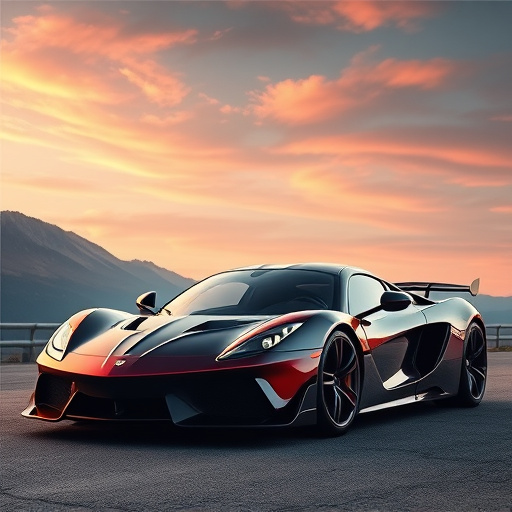Black smoke from diesel trucks signals inefficient combustion, driven by issues like poor air-fuel mixture or faulty timing. Strict emission standards, particularly for vehicles with cold air intakes (CAIs), require modern engines to feature technologies such as SCR systems and particulate filters. Older models may need retrofitting or routine maintenance to meet these standards, especially during towing operations. Diesel truck CAIs significantly reduce black smoke emissions by drawing in colder, denser outside air, enhancing combustion efficiency and engine performance, even during prolonged towing sessions or heavy traffic conditions.
Black smoke emanating from diesel trucks isn’t just a visual concern; it’s a sign of inefficient burning, often due to poor air intake. This article delves into the world of black smoke reduction in diesel trucks, exploring two primary solutions. We examine the impact of understanding black smoke and its causes, specifically in diesel engines. Furthermore, we highlight the role of cold air intakes in minimizing black smoke and enhancing performance. Additionally, we discuss how efficient air intake systems optimize towing capabilities, making these modifications essential for eco-friendly and powerful trucking.
- Understanding Black Smoke in Diesel Trucks: Causes and Impact
- The Role of Cold Air Intakes in Reducing Black Smoke
- Optimizing Towing Performance with Efficient Air Intake Systems
Understanding Black Smoke in Diesel Trucks: Causes and Impact

Black smoke from diesel trucks is a visible sign of inefficient combustion, often caused by various factors related to engine performance and operation. In diesel engines, black smoke typically indicates that the fuel isn’t burning completely, leading to the emission of unburned hydrocarbons and particulate matter. This can be attributed to several reasons: poor air-fuel mixture due to clogged or improperly calibrated sensors, incorrect timing, or issues with the fuel injection system. Diesel trucks equipped with cold air intakes (CAI) designed for improved performance and towing capabilities might experience heightened black smoke emissions during certain conditions, such as heavy loads or prolonged idling.
The impact of black smoke is significant both environmentally and legally. Exhaust emissions containing particulate matter and unburned hydrocarbons contribute to air pollution and can have adverse health effects. In many regions, stringent emission standards regulate the amount of pollutants allowed from vehicles, particularly diesel trucks. To meet these standards, modern diesel engines employ advanced technologies like selective catalytic reduction (SCR) systems and particulate filters. However, for older models or those not equipped with such advanced features, visible black smoke can be an indicator of needing retrofitting or routine maintenance to ensure compliance with emission regulations and to maintain optimal engine performance during towing operations.
The Role of Cold Air Intakes in Reducing Black Smoke

Black smoke from diesel trucks, often a concern for both environmentalists and drivers, can be significantly reduced through strategic modifications. One such effective solution is the implementation of cold air intakes (CAIs). These systems play a crucial role in optimizing engine performance during towing or heavy-duty operations, leading to a substantial decrease in black smoke emissions.
By drawing in colder air from outside the engine compartment, diesel truck cold air intakes enhance combustion efficiency. The cooler air is denser, providing a higher oxygen-to-fuel ratio inside the engine, which results in cleaner burns and reduced particulate matter. This simple yet powerful modification ensures that drivers can enjoy improved engine performance while contributing to a cleaner environment, especially during long towing sessions or in heavy traffic conditions.
Optimizing Towing Performance with Efficient Air Intake Systems

Optimizing towing performance for diesel trucks involves integrating efficient air intake systems, particularly those featuring cold air intakes (CAI). By directing cooler, denser air into the engine, CAI systems enhance combustion efficiency, leading to improved torque and power outputs. This is especially beneficial during towing operations when the engine demands higher airflow to maintain speed while hauling heavy loads.
Diehard truck owners and professionals alike recognize the impact of a well-designed CAI on fuel economy and overall performance. Integrating these systems allows for more effective utilization of diesel engines’ potential, ensuring smooth acceleration and sustained power throughout various towing scenarios. This is crucial for tasks that demand frequent stops and starts or when navigating challenging terrains with heavy trailers attached.
Black smoke from diesel trucks, primarily caused by incomplete combustion and poor fuel-air mixing, poses environmental and health risks. While various factors contribute to this issue, cold air intakes (CAIs) emerge as an effective solution for reducing black smoke emissions. By maximizing oxygen availability and improving combustion efficiency, CAIs not only enhance the performance of diesel trucks but also promote cleaner towing experiences. Integrating efficient air intake systems can significantly mitigate environmental impact, ensuring a greener future for diesel truck operations, especially in heavy-duty applications.














